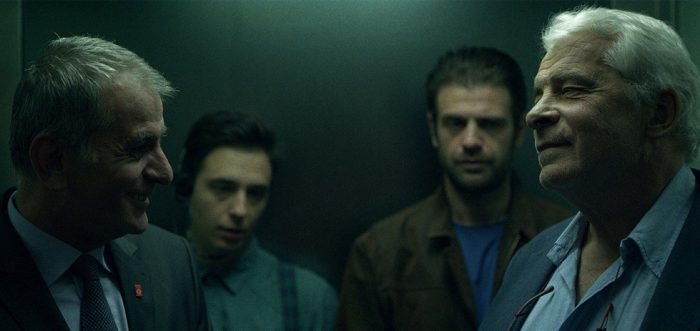
Europe’s instability has been a frequent point of discussion in recent years, with the prospect of Greece and Britain leaving the Eurozone bringing these fissures to a head. Benard Henri-Levy’s Hotel Europe, a play that looks at the crisis of the “European project”, worked on theorising the idea that the disunity of the present was a product of the tensions the last century; with the assassination of Franz Ferdinand that began the Second World War and the Bosnian War of the early 90s both observed as two key events behind it. Danis Tanović’s Death in Sarajevo adapts Henri-Levy’s play in a well-established, albeit frantic reflection on the intersecting historical tensions that have defined the identity of the titular city.
Although the entire film contained within the single location of a struggling hotel in Sarajevo,1 Tanović’s characters and their interactions with their setting and one another are layered and diverse. Their relationship with the crises of the previous century are framed in a complexity in their distinctions from one another.
The environment fuels the narrative throughout, with the hotel serving as a point of intersection for different perspectives on the place of the city. Within the context of the hotel, we see the manifestations of how circumstance defines responses to crises. In Omer, the manager of the hotel, which is failing under his jurisdiction, we’re shown a frustrated boss—forced to negotiate with criminals who operate a club in the basement, to push back against a strike. In Lamija and Hatidza, Tanović articulates a generational dichotomy between the post-war women, one at the beginning of her career and with everything to lose, the other towards the end of her own. Edo is a frustrated security guard, arguing on the phone with his wife, whilst abusing drugs to stay awake on the job. Framing all of this is Jacques, who spends the duration of the film in the hotel’s penthouse, reciting what is later revealed to be lines from his upcoming part in a rendition of Henri-Levy’s aforementioned play.
In this ensemble cast, Death in Sarajevo presents itself as a work with a dense piece, filled with conflicting perspectives and experiences and carefully laid out in Tanović’s establishing scenes. That said, it’s in the back-and-forth between Vedrana, a newsreader broadcasting the centenary of Ferdinand’s assassination from the roof of the hotel overlooking the city, and Gavrilo, a Serbian national who is the third guest on Vedrana’s special, that gives Death in Sarajevo its ideological tension and pacing. Commencing as a relatively friendly back-and-forth, Gavrilo’s assertion that Gavrilo Princip was a hero sees the film leaving the “on-air” style behind for more cinematic framing, as the two walk off set and continue arguing across the hotel rooftop. Their back-and-forth gives two starkly distinct (albeit equally passionate and clearly-articulated) interpretations of the history their two nations share with one another, and neither capitulate throughout.
While this is clearly the most overt treatment of the subject matter, the existential conflict that the Yugoslav Wars piked, and the fallout from it, is at the centre of the majority of what plays out on screen. While Vedrana and Gavrilo’s argument is a more literal take on the conflict, every arc within Death in Sarajevo offers a personal interaction with the intricate history of Sarajevo. While the film develops pacing issues towards the end, bogged down by the complexity Tanović handles with such precision in his film’s first-half, the strength of integral establishing scenes guides the film through the chaos that emerges later. This leaves a sense of longing on some levels, imagining how this film would play if it closed as well as it opened, however, it emerges as a work with merits far outweighing these weaknesses; a tense, thought-provoking, nuanced and captivating reflection on the identity of a region. After the success of Tigers and Death in Sarajevo, Danis Tanović is establishing himself as one of the Eastern Europe’s most consistent and insightful directors.
Around the Staff
| Virat Nehru | |
| Conor Bateman | |
| Jaymes Durante |
